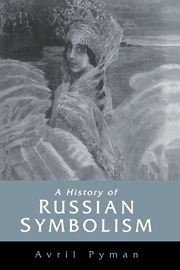Book contents
- Frontmatter
- Contents
- Preface
- Acknowledgements
- Note on the text and list of abbreviations
- Prologue: decadence or rebirth? The European fin de siècle and the Russian precursors
- Part 1 The art of the cell
- Part 2 Collective creation
- Part 3 Gleams of paradise
- Part 4 A glittering hell
- Part 5 Our home from the beginning
- 11 ‘From the real to the more real’. Blok's ‘Russia and the Intelligentsia’. Ivanov's ‘A realibus ad realiora’. Bely's and Remizov's prose. (1907–10)
- 12 Russian Symbolism and Russian literature. Apollon and Annensky's summing-up. ‘The crisis of Symbolism’. Disintegration and reconciliation. (1909–10)
- Epilogue
- Chronology
- Notes
- Bibliography
- Index
11 - ‘From the real to the more real’. Blok's ‘Russia and the Intelligentsia’. Ivanov's ‘A realibus ad realiora’. Bely's and Remizov's prose. (1907–10)
Published online by Cambridge University Press: 08 January 2010
- Frontmatter
- Contents
- Preface
- Acknowledgements
- Note on the text and list of abbreviations
- Prologue: decadence or rebirth? The European fin de siècle and the Russian precursors
- Part 1 The art of the cell
- Part 2 Collective creation
- Part 3 Gleams of paradise
- Part 4 A glittering hell
- Part 5 Our home from the beginning
- 11 ‘From the real to the more real’. Blok's ‘Russia and the Intelligentsia’. Ivanov's ‘A realibus ad realiora’. Bely's and Remizov's prose. (1907–10)
- 12 Russian Symbolism and Russian literature. Apollon and Annensky's summing-up. ‘The crisis of Symbolism’. Disintegration and reconciliation. (1909–10)
- Epilogue
- Chronology
- Notes
- Bibliography
- Index
Summary
мера нашей утонченности исполнилась […] и потому мы вправе стать реалистамн в новом смысле.
Блок Станиславскому, 9 декабря 1908Just as the Symbolists had reacted to the Revolutionary turbulence of the years 1904–6 by trying to find adequate expression for it in their works, so now they reacted to the stillness which was settling back over their country – which they felt to be no more than a lull – by an attempt to leaven that stillness with recall and foreboding. This involved a sharp-focus selective observation and depiction of foreground detail which is neither the static word-painting of the Parnassians nor the causal, all-round view of man in society associated with Realism. Although it had much in common with Impressionism, always a component of the art of the period, this new trend differed from nineteenth-century Impressionism by virtue of the conscious, implicit subtext of myth and multiple cultural associations. The Symbolists began to write less of Heaven and Hell, centaurs and Argonauts, earth-spirits and star-maidens, and more of Russia and the Intelligentsia, town and country, politics and industry. The world of their art, though, remained a mobile, shifting world of many dimensions, and the old themes were present in the new, moving the world perceptible to the senses in ways which could not be calculated but only felt and – perhaps – understood.
- Type
- Chapter
- Information
- A History of Russian Symbolism , pp. 305 - 322Publisher: Cambridge University PressPrint publication year: 1994
- 1
- Cited by



